Clauses and Phrases
Skip to the clauses and phrases worksheets and activities
Clauses and phrases are the building blocks of sentences. Every sentence must have at least one clause to be considered grammatically correct. Understanding how clauses and phrases work will help you better understand sentence structure. You’ll need to have a working knowledge of subjects, predicates, and objects before you continue.
A sentence can have more than one clause, but it needs AT LEAST ONE CLAUSE or it is a fragment, not a sentence.
I love learning, so I spend a lot of time reading.
In the first example sentence, the action is took. Ask yourself, "Who took?" Since I takes the verb, I is the subject. Together, the subject and the predicate form a clause. So the first example sentence has one clause.
The predicate in the second sentence is love. So we ask ourselves, "who loves?" The answer to this question is I, so I takes the predicate love. Together, they form a clause. But there is another predicate in this sentence. Spend is also a predicate. Once again, the subject I takes this predicate. So this example sentence has one subject and predicate working together in the first clause, and a second subject and predicate working together in the next clause. The second example sentence has two clauses.
Phrases do not contain a subject and a predicate, or we would call them clauses. Phrases provide additional information about subjects, predicates, and / or objects. Understanding how phrases work is helpful when analyzing sentence structure.
I left my keys inside of the Whole Foods, my favorite grocery store.
In these example sentences, the phrases are red. The first example sentence has a predicate, fell, and a subject, Jack. The phrase provides additional information about the subject, but it is not required to form a complete sentence. The phrase does not contain a subject and a predicate. It cannot grammatically stand by itself.
In the second example sentence, the predicate is left and the subject is I. On the other side of the sentence, a phrase provides additional information about an object in the sentence, Whole Foods. Phrases can come at the beginning, middle, or end of sentences. Try reading the sentence without the phrase and notice that the sentence does not actually NEED the phrase. It is grammatically nonessential. Then try reading the phrase without the rest of the sentence. Notice that it hangs? The phrase depends on the sentence to complete its meaning.
Clauses and Phrases Worksheets and Activities
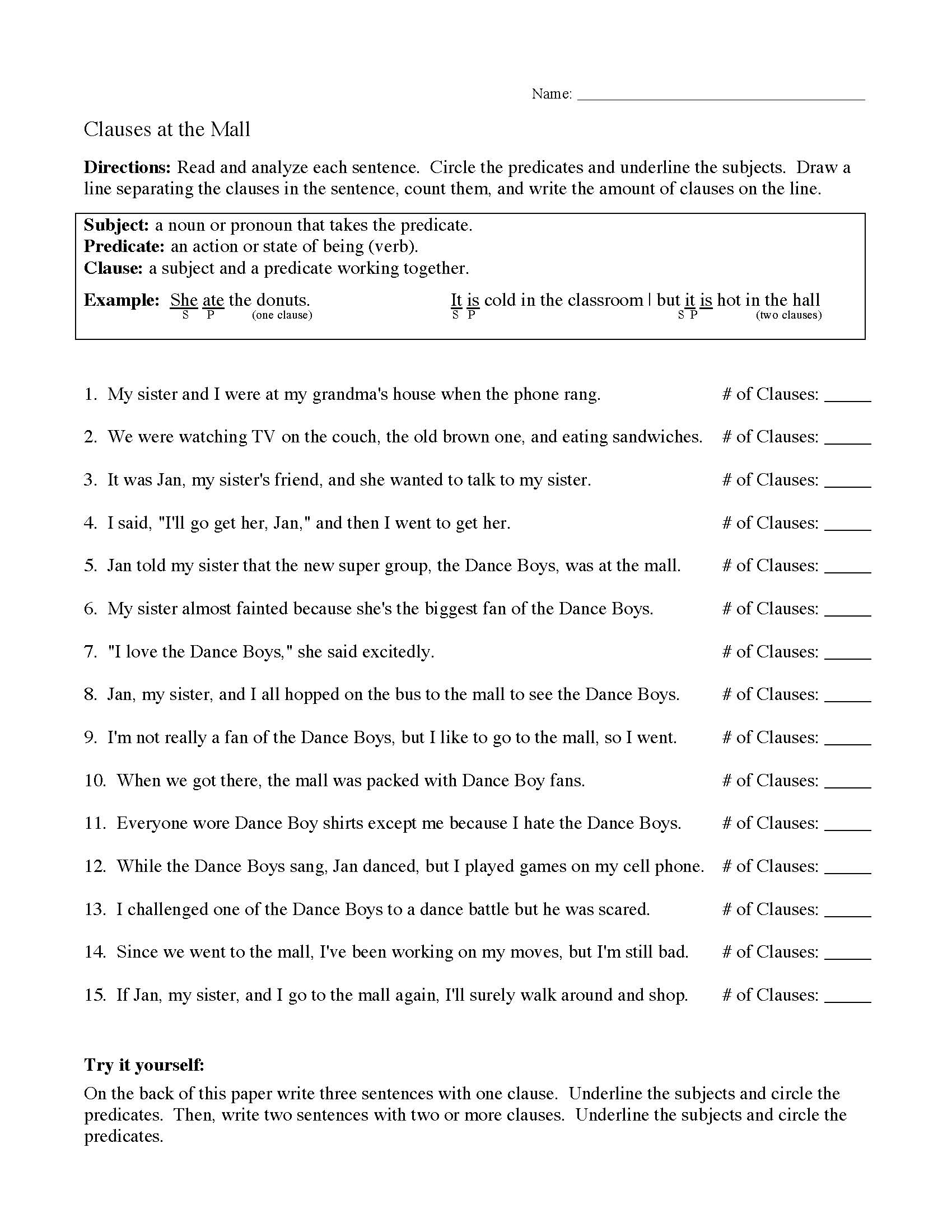
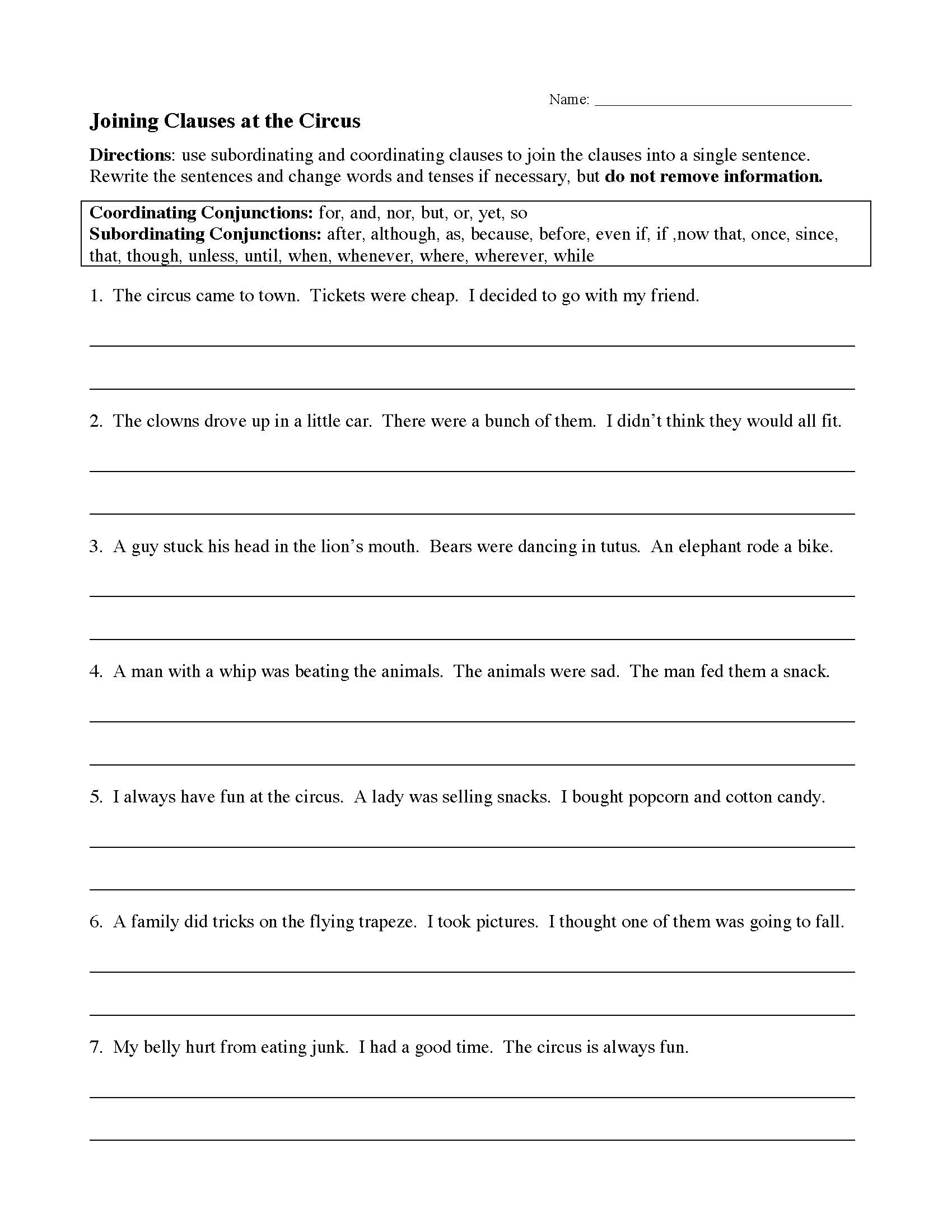
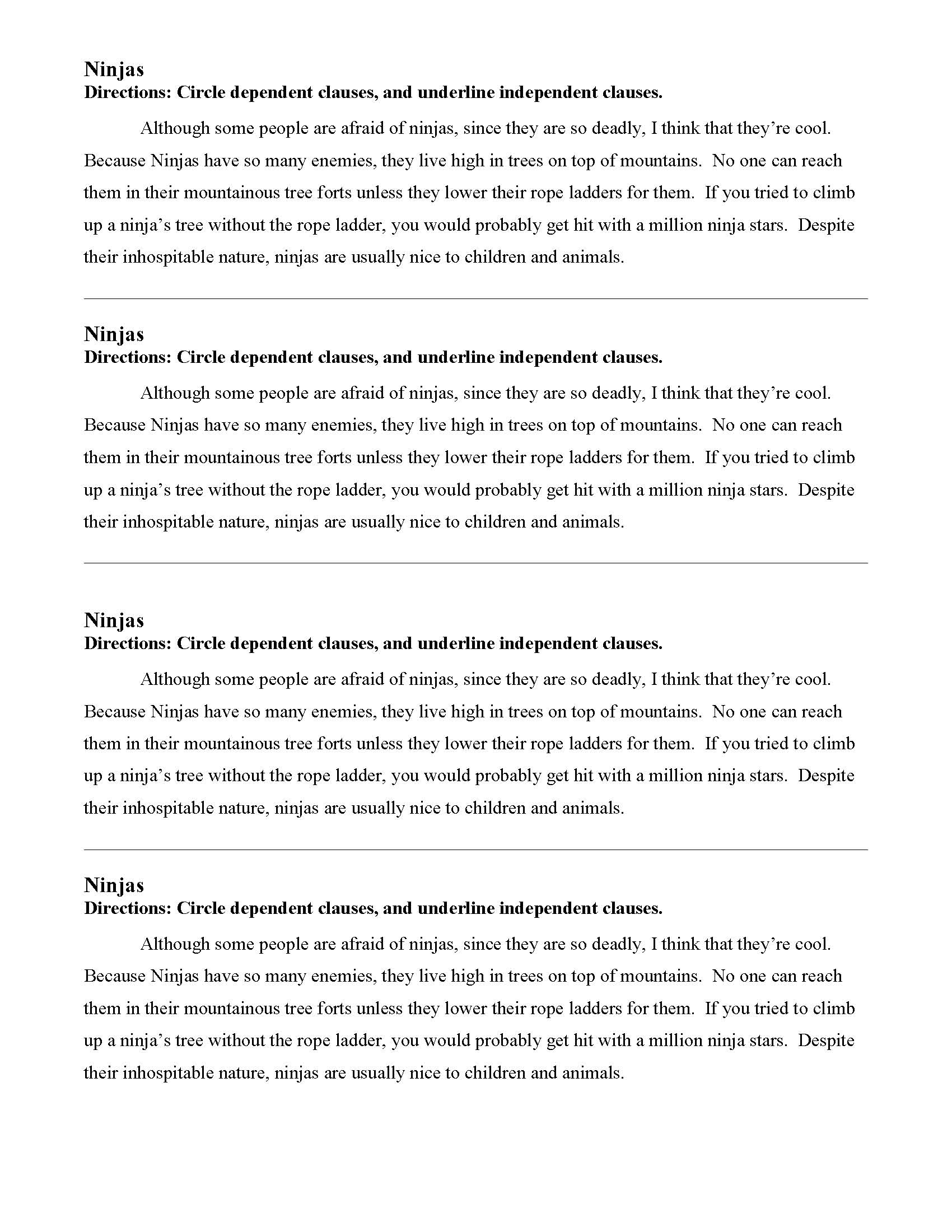
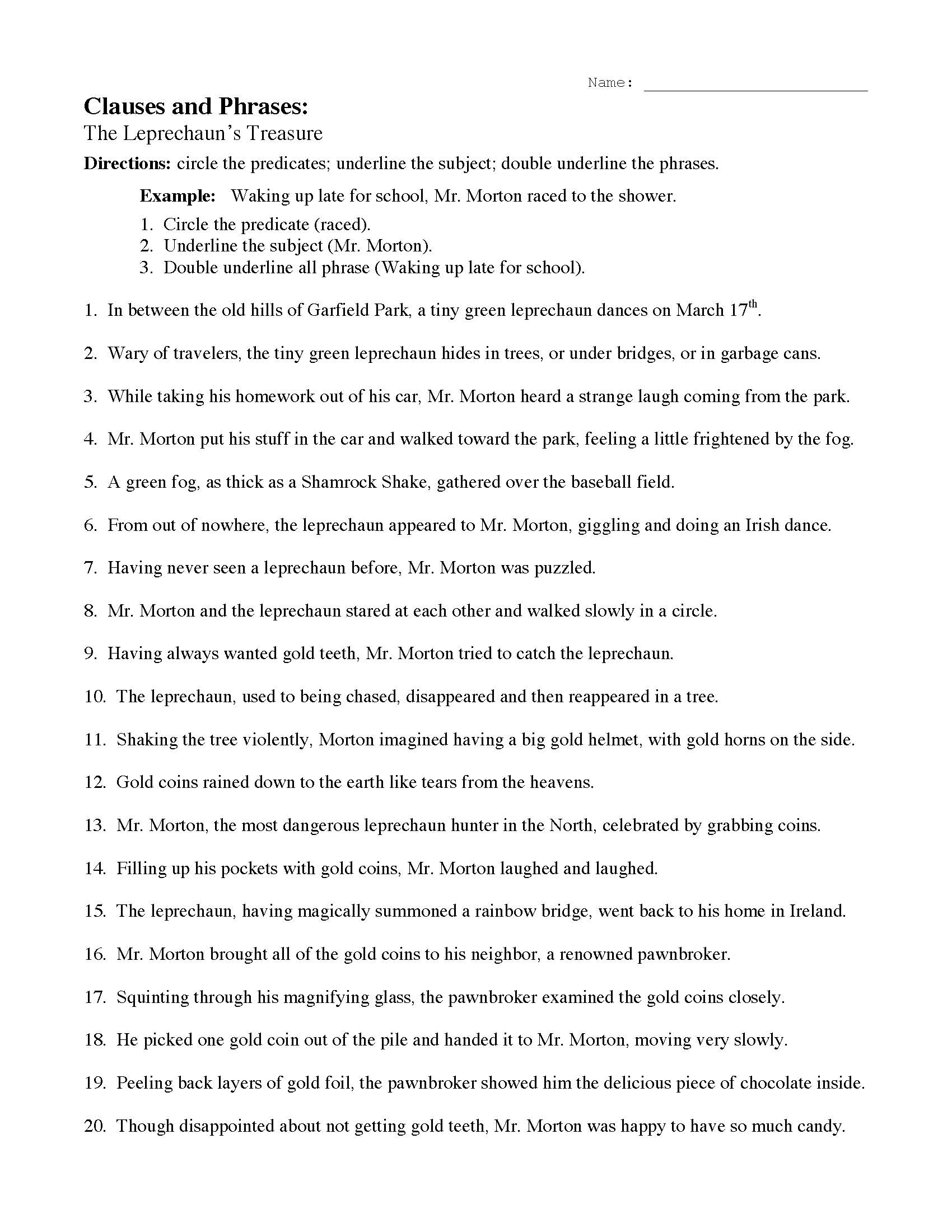


Clauses and Phrases
Common Core State Standards
L.K.1f - Produce and expand complete sentences in shared language activities.
L.1.1j - Produce and expand complete simple and compound declarative, interrogative, imperative, and exclamatory sentences in response to prompts.
L.2.1f - Produce, expand, and rearrange complete simple and compound sentences (e.g., The boy watched the movie; The little boy watched the movie; The action movie was watched by the little boy).
L.3.1i - Produce simple, compound, and complex sentences.
L.4.1e - Form and use prepositional phrases.
L.4.1f - Produce complete sentences, recognizing and correcting inappropriate fragments and run-ons.
L.7.1a - Explain the function of phrases and clauses in general and their function in specific sentences.
L.9-10.1b - Use various types of phrases (noun, verb, adjectival, adverbial, participial, prepositional, absolute) and clauses (independent, dependent; noun, relative, adverbial) to convey specific meanings and add variety and interest to writing or presentations.
Search here.
50 Comments
Leave a Reply
- Author's Purpose Worksheets
- Characterization Worksheets
- Conflict Worksheets
- Fact and Opinion Worksheets
- Figurative Language Activities
- Figurative Language Poems with Questions
- Genre Activities
- Irony Worksheets
- Making Predictions
- Mood Worksheets
- Nonfiction Passages and Functional Texts
- Parts of Speech Worksheets
- Poetic Devices
- Point of View Worksheets
- School Project Ideas
- Setting Worksheets
- Simile and Metaphor Worksheets
- Story Structure Worksheets
- Text Structure Worksheets
- Theme Worksheets
- Tone Worksheets
- ALL PAGES AND WORKSHEETS




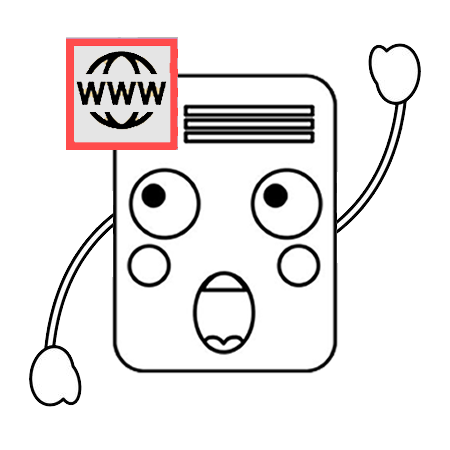


Priya
/ September 29, 2020Can u explain dependent and independent phrase and clause
Mr. Morton
/ December 7, 2020Independent clauses have a subject and a predicate and express a complete thought. Dependent clauses have a subject and a predicate but do not express a complete thought because of a conjunction like “because.”
Pulkit
/ July 19, 2019Please sir can you explain the types of clauses
Pulkit
/ July 19, 2019Sir can you teach me some tricks to identify phrases and clauses tomorrow is my exam
Ariv
/ July 18, 2019I still dont understand it
Amudha Godfrey Fernando
/ March 4, 2019Can u give the answer
As soon as possible
Mr. Morton
/ March 6, 2019Which answer?
Nishi
/ February 28, 2019Plz provide some worksheet and test papers to
Solve and gain more marks
Mustansir
/ February 21, 2019I want to give test of adverb clauses and phrases
Ritika
/ October 13, 2018What is a phrase?
Mr. Morton
/ October 13, 2018A phrase is a group of words containing a subject OR predicate (or object) but not a subject AND a predicate. A subject AND a predicate makes a clause.
There are lots of different types of phrases. For example, the prepositional phrase, which provides information about the location of the subject or object in time and/or space.
I left my folder under the desk.
This is a prepositional phrase providing more information about the location of an object (the folder) in relation to another object (the desk).
Phrases often provide additional information and are not essential to the sentence construction, unlike the clause, which is the essential part of the sentence, I left in the above example.
Chirag Shah
/ October 3, 2018Very nice work Mr Morton
Keira
/ July 3, 2018Thanks a lot. This helped me. Tomorrow is my exam and this is just the right thing i need.. Thanks a lot! Have a nice day, Mr. Morton. 😀
surjith
/ September 17, 2017This is very useful for learning.it teaches us more.it is very good job.I am 7th grade.
blue
/ September 5, 2017i liked the worksheets.
it was good.
Alegbe Joyce
/ May 21, 2017Great !
meghana
/ May 20, 2017sir what is the difference between a subordinate
and coordinating clause?
jane
/ May 15, 2017Can you have a dependent clause without subject or verb even though it does not have a complete thought?
Mr. Morton
/ May 31, 2017No, by definition a clause must have a subject and a predicate. Conjunctions are what make them dependent.
mubasher ktk
/ March 18, 2017Sir
I am confused in sentence , phrase and clause. Give me 10 of 5 examples of each in a same sentence
Mr. Morton
/ March 22, 2017Clauses.
1. This is a clause.
2. Clauses have subjects and predicates.
3. Clauses can stand by themselves and express a complete thought.
4. Some sentences have multiple clauses.
5. Sentences with just one clause are called “simple sentences.”
Phrases
1. The frequently used phrases
2. cannot stand alone
3. The red, red horse
Well, I hope you get the idea.
farah
/ July 13, 2018Thanks a lot sir. This is really helpful for the second language learners.
taylor
/ March 13, 2017this is kind of tough sir. any extra helps??
jamal
/ March 6, 2017Tell me whether it is phrase or clause in following sentence
Because of the cost which I bought from the pot pouri
Mal
/ March 10, 2019because of the cost which i bought from the poy pouri
Hey Jamal,
Jamal first ,the punctuation of your sentence is wrong.It should be like – Because of the cost, which i bought from pot pouri.
so, this sentence is a subordinate clause.
logan waldschmidt
/ March 2, 2017could you please make a dependent and independent clause about how to become a ninjas please today
Jacquilin
/ January 31, 2017Dear sir,
I am confused between Past Perfect and Present Perfect tense.
Mr. Morton
/ March 13, 2017What confuses you?
Lavish Beniwal
/ December 13, 2016What is the difference between phrase and dependent clause?
Mr. Morton
/ March 14, 2017A clause has a subject and a predicate. A phrase does not.
Krithik
/ September 8, 2016Help me in clauses
Mr. Morton
/ September 10, 2016How can I help you?
dharmendra shakya
/ February 8, 2016sir! am confused…. whether what’s the difference between “”Tense & Sentence”””I didn’t to this day such teacher…. who could able off my confusion…. I want a group created in that we all of student could well study sir…. my fb id “”Dharmendra shakya ….u can find my 8445950373
Mr. Morton
/ February 9, 2016Hello.
Sentences are grammatical units containing at least one subject and a predicate.
Predicates are verbs.
Tense is related to verbs.
It is well known that verbs express actions,
but it is lesser known that verbs have the extra role of showing time.
We conjugate verbs to show time. This is called verb tense.
Since every sentence must have a verb, and every verb has a tense, every sentence has a tense.
Let’s Look at an Example:
Mr. Morton walked to the store.
This sentence has one predicate, which is the verb walked.
Walked is the past tense verb form of walk.
The past tense form of a verb shows that the action occurred in the past. It is usually formed by adding “-ed” to the end of the verb.
If you want to know more about verbs and verb tense, or subjects and predicates, you should check out my free parts of speech web app. I think Units 2 and 6 would be of interest to you.
Best wishes!
nada kh.
/ November 30, 2015thank you so much , I have exam and my teacher did not talk about it too much…..again thank you !
Sola
/ November 10, 2015Thank you
Shuvankar Biswas
/ July 2, 2015Thanks a lot just for u for this God bless you!
Lillian
/ January 5, 2017my exams are coming up and its my first time doing them and this helped me alot
a_emad
/ January 16, 2015Wow! Our teacher doesn’t explain grammar well and this really helped me a lot. Thank you! You are the kindest and sweetest person ever!
Kanika
/ September 19, 2014Thank u for sorting out my problem . Have a nice day
Mr. Morton
/ September 25, 2014Thank you. You as well.
Kanika
/ September 19, 2014U helped me a lot tomorrow is my exam and I need it . Thank u and be happy
Maria Argote
/ September 11, 2014Love your website.
I find it extremely helpful.
Thank you so much!
shrevarna shaji
/ March 3, 2014wow!!!!!!!awesome…..:)
shae
/ February 19, 2014thank you so much this helped a ton i was given this site and we have to write a paper on it and on a ton of your other sites. we also have to do some worksheets but this is hopefully stick in my brain. thanks!! this is an amazing site (:
T-MAC
/ January 14, 2014good job
Adrian Castillo
/ August 26, 2013Nice work!!
Ya Jahou Bah
/ June 23, 2013Hi…………. thank you very much……….. you helped me alot. Tomorrow is my exams and I really needed to know more about these things………….. once again thank you may GOD bless you……………. I am in 8th grade……………. thirteen years old.
Miggy
/ January 16, 2012You’re worksheets are very useful.!! Good job !
Allison
/ August 28, 2013*Your (Come on, you’re on a grammar website.)